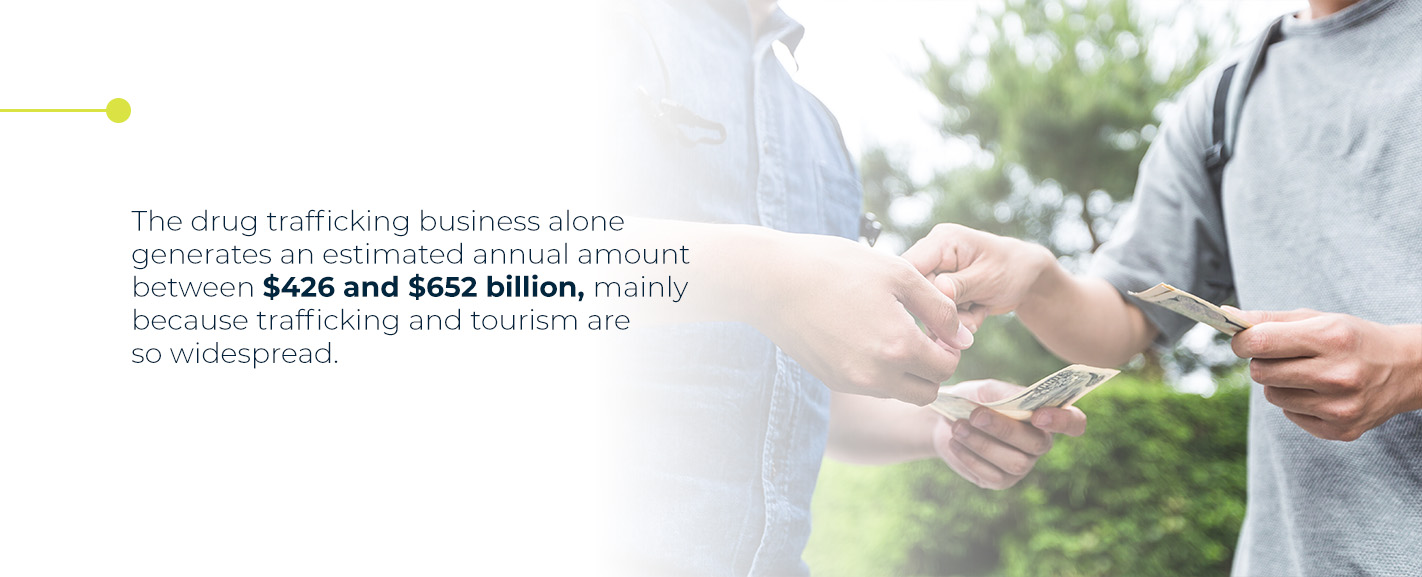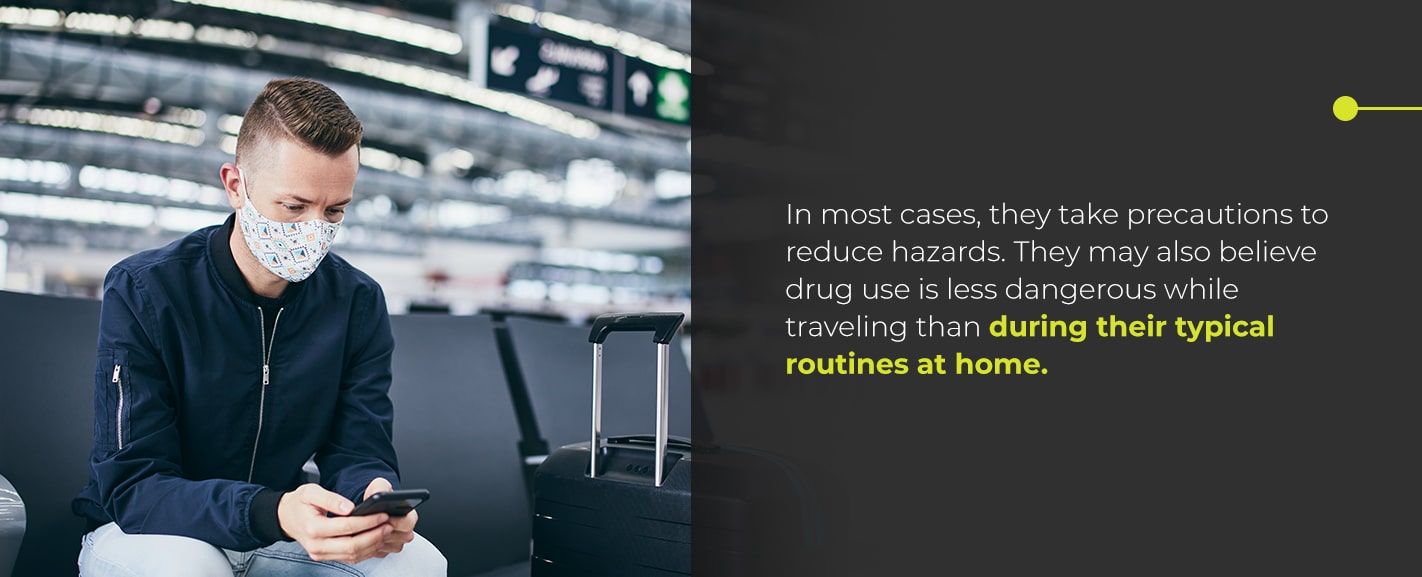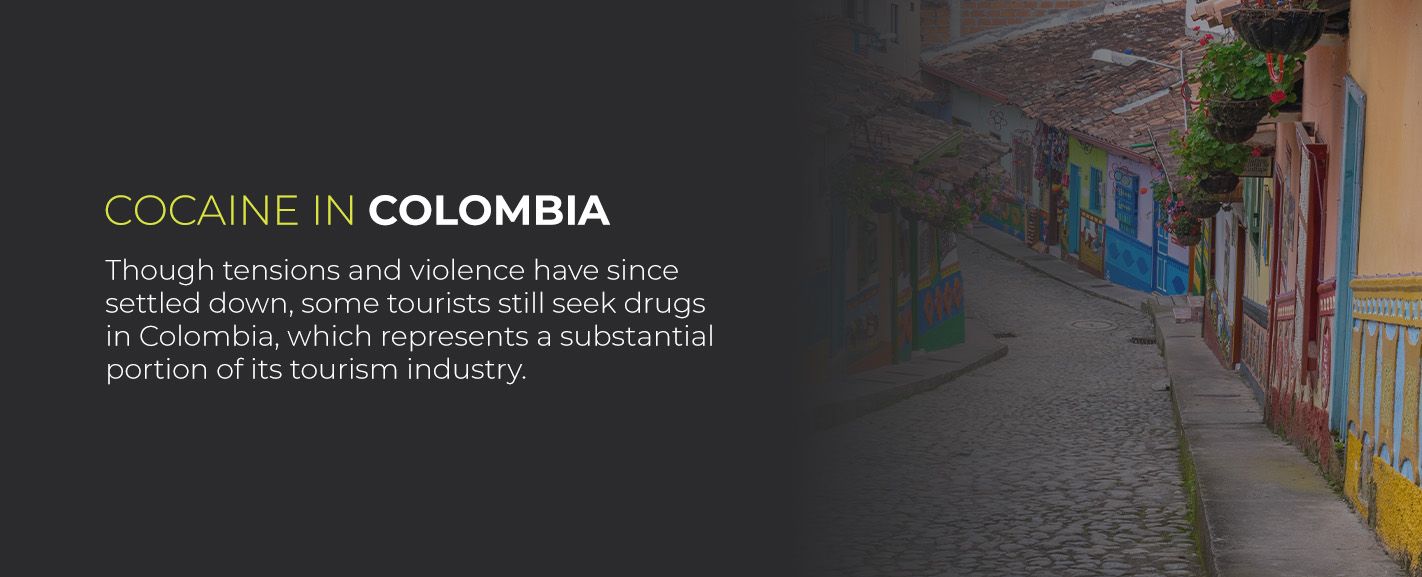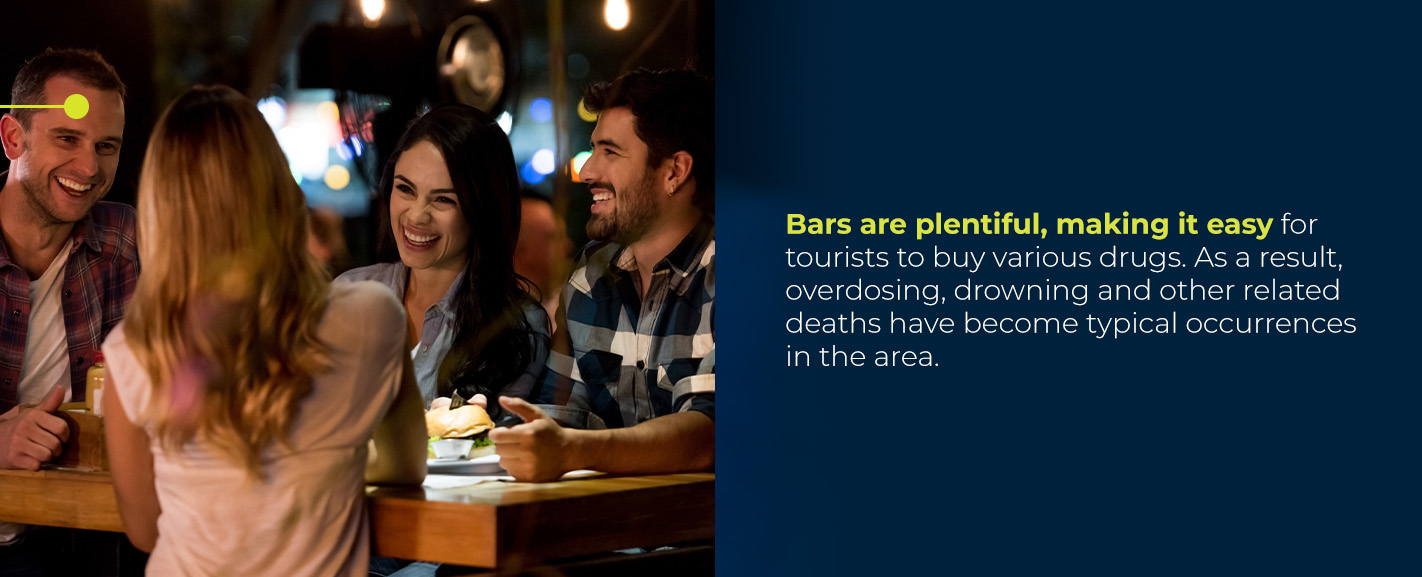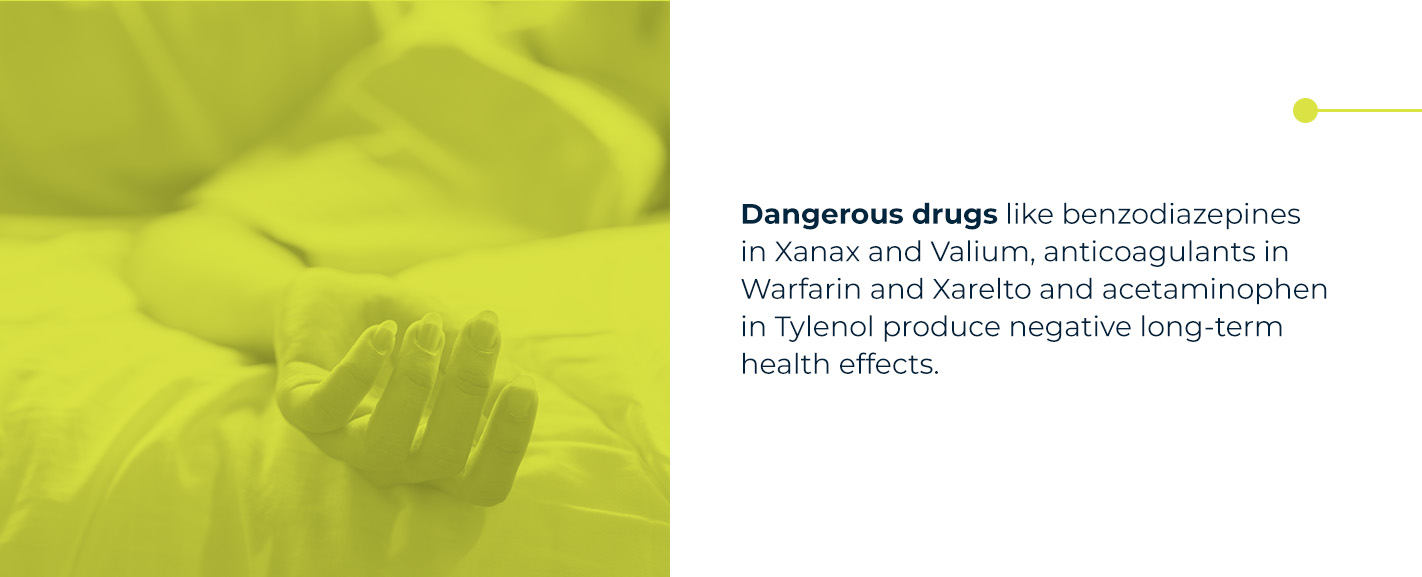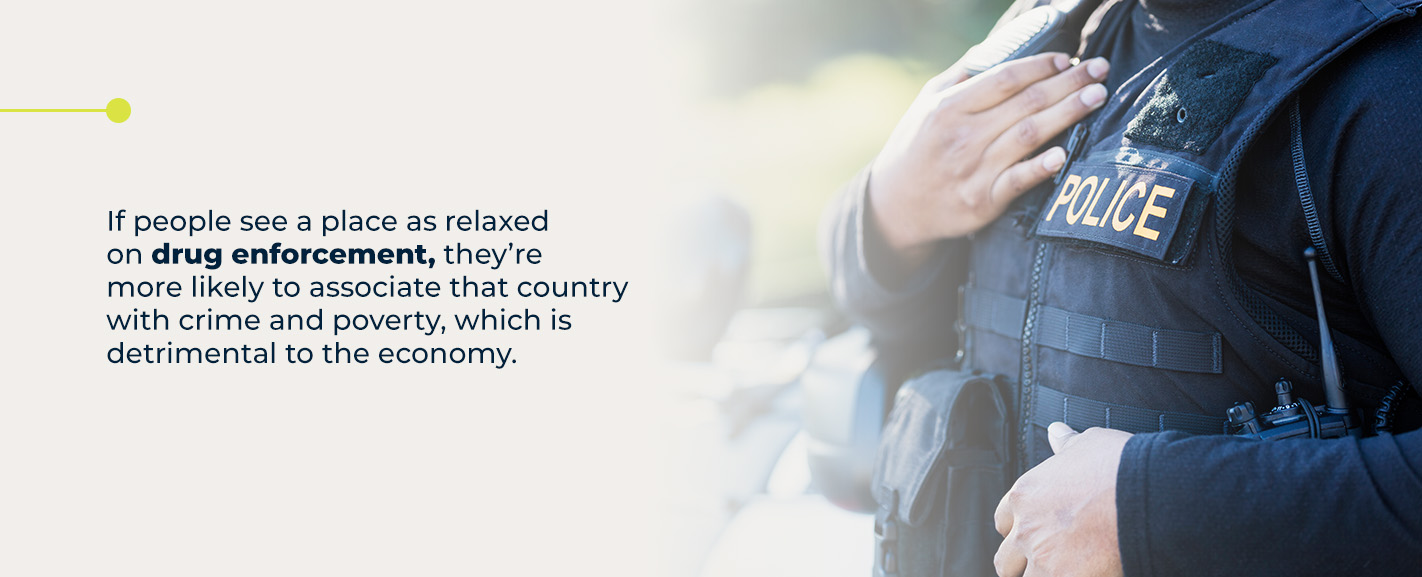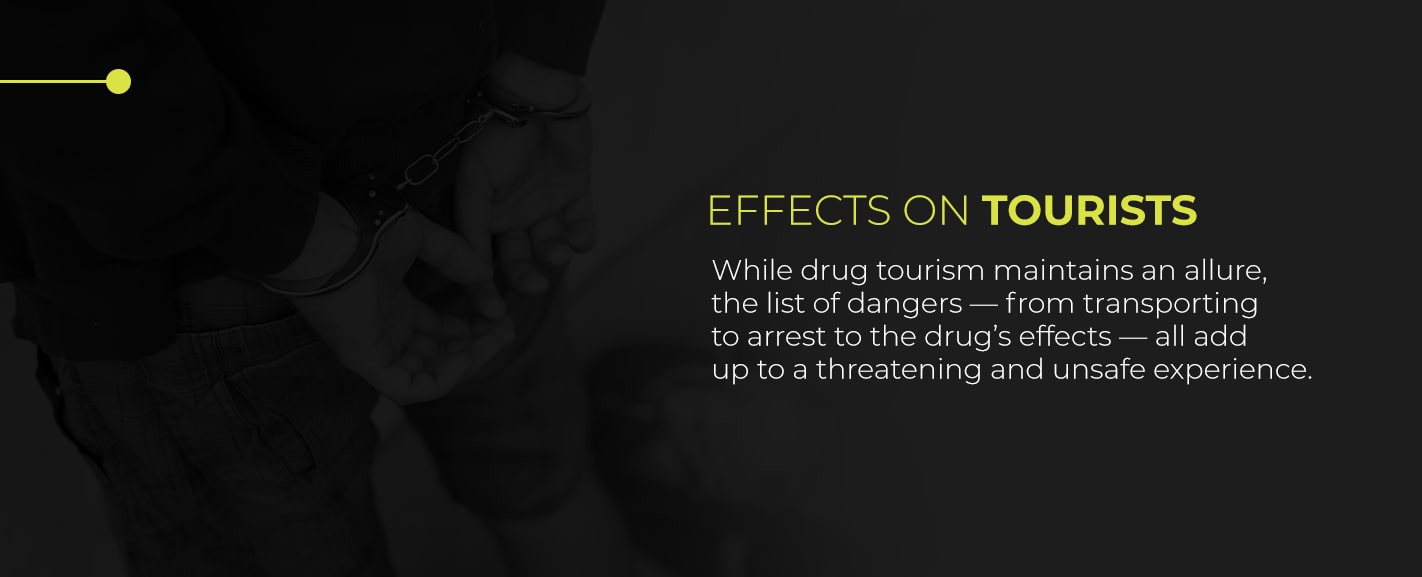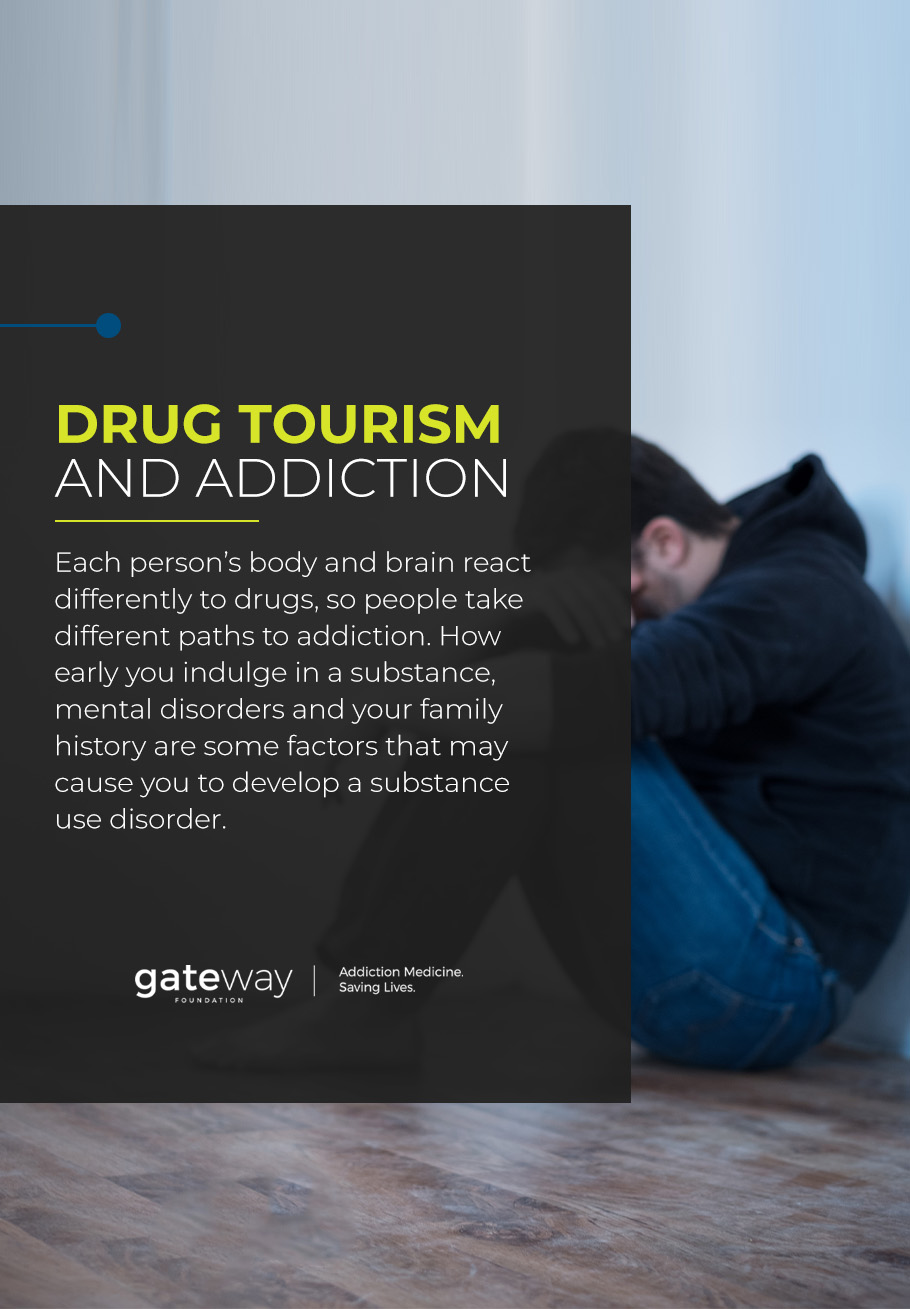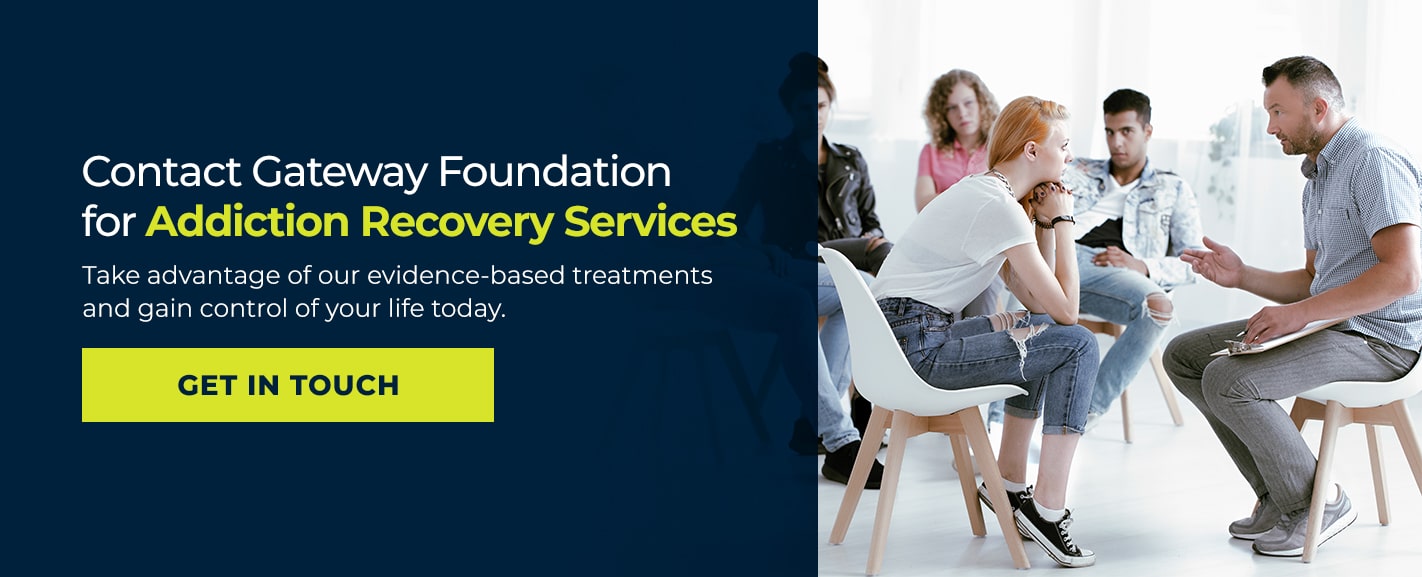- Dec 17
- AddictionDrug Addiction Treatment
Drug tourism is when people travel to a select destination to buy or use drugs for any reason. These journeys can be for recreational or personal use and don’t even have to be a long trip. For example, people traveling from Kansas to Colorado to smoke marijuana would be participating in drug tourism. These drugs are usually illegal or unavailable in the traveler’s country or state, so they visit a well-known place like the Netherlands to obtain and use those substances. People worldwide understand where the popular destinations are, so they flock to those places in droves.
Drug tourism dates back centuries ago when spice traders would go to other countries to get the spices unavailable at home. With the advancement of technology and transportation, tourism is more popular than ever, reaching around 1.46 billion travelers in 2019. With the increase in travel comes a rise in event, restaurant and drug sales. These three industries generate a large portion of their revenue from tourism, and they’re only going to increase in the U.S. as the legalization of cannabis continues to spread to more states.
The Drug Tourism Industry Today
The drug trafficking business alone generates an estimated annual amount between $426 and $652 billion, mainly because trafficking and tourism are so widespread. A study in the 1990s performed an in-depth analysis of “tourist experiences from a phenomenological perspective.” The study approaches the concept of drug tourism beginning when the tourist is aware of the substance’s existence. Even if they find out about a drug’s availability while at a vacation destination, that would still fall within the category.
This type of tourism involves a person or group who directly experiences the consumption and use of illegal drugs. Often, this can be very dangerous to the traveling parties if they are not familiar with the area or language. Unknown suppliers and isolation from trusted friends or family can cause trouble for the involved individuals, especially when considering the unofficial integration process into the drug scene tourists go through by locals. You may be asking, “But why would anyone participate in this if there’s an inherent risk?”
Why Do People Engage in Drug Tourism?
People participate in drug tourism for many reasons. Some want to unwind and enjoy substances ordinarily unavailable to them. Others want to take advantage of the relaxed environment and experience a different culture. Many people engaging in this tourism believe they are not hurting anyone, but rather helping the local economy.
Instead, the opposite is often true. Countries like Colombia and Mexico experience high levels of poverty as a result of drug cartels. However upsetting these facts are, people continue to search for party scenes worldwide, which leads them to popular drug destinations. On the other hand, not all drug tourism is so problematic — prescription drugs fall under this category, too.
Tourists traveling to get a cheaper prescription for something they need is understandable and even encouraged in some areas. Americans know firsthand how expensive prescription drugs can be, with prices much higher than in other parts of the world. From 2000 to 2017, spending increased by 76%. Americans pay, on average, 256% higher prices than 32 other countries.
So, in essence, people who engage in drug tourism are looking for a cheaper prescription or a memorable experience. Those who sell drugs to tourists are everywhere, and they become entrenched in the local economy. Popular destinations like South America and Southeast Asia are hotspots for this type of tourism, making them more desirable to travelers. In general, tourists are aware of the legal, medical and social risks of using drugs on vacation. In most cases, they take precautions to reduce hazards. They may also believe drug use is less dangerous while traveling than during their typical routines at home.
Popular Drug Tourism Destinations and What Drug Tourists Seek
Drug tourism happens worldwide, but a few concentrated areas attract more tourists than others, perhaps because of cultural appropriation, governmental relaxation or widespread access. South Asia — including Thailand and Laos — the Netherlands and the Americas are all well-known tourist destinations where visitors can drink alcohol and access drugs.
The local economies are aware of the money they make from these tourists, so they may advertise to attract more people. These tourists are looking for an atmosphere where they can indulge in something they’ve never experienced before. In some cases, they’ll continue using the substance at home.
Cocaine in Colombia
Specific countries have had a significant challenge addressing drug problems, and Colombia is a prime example. The Colombian conflict began in 1964. It perpetuated social unrest among the population and caused them to become distrustful of the government. Eventually, poverty started to increase, and people turned to dealing marijuana in the 1970s.
Marijuana dealing transitioned into cocaine dealing. With the change came violence, which got so intense that Medellin, Colombia, became the unofficial murder capital of the world in the 1990s. Though tensions and violence have since settled down, some tourists still seek drugs in Colombia, which represents a substantial portion of its tourism industry.
Marijuana in the Netherlands
At this point, the Netherlands is almost synonymous with marijuana and drug tourism. The Dutch government is undoubtedly aware of how much their economy depends on cannabis — they’ve decriminalized possession of under five grams and allowed for a significant increase of pot cafes throughout the city.
However, it may soon be against the law for foreigners to consume marijuana in the Netherlands. Amsterdam’s mayor is seeking to make it illegal for shops to sell marijuana to anyone but Dutch nationals and Netherlands residents. Stricter regulations stem from issues drug tourism has caused. For example, increasing short-term accommodations for tourists has led to housing shortages for locals. In addition, marijuana resale in the country depends on illegal enterprises, which the government hopes to combat.
Marijuana in Washington and Colorado
Washington and Colorado became the first two states in the United States to approve recreational marijuana use in 2012. Decriminalization led to an influx of tourists and visitors seeking ready access to the drug. However, there are still strict laws in place, including a ban on smoking marijuana in public or in most hotels.
The most significant problem tourists run into is indulging in too many marijuana edibles, which lead to health problems. Out-of-state emergency room visits for marijuana-related sickness or symptoms have increased. Tourists who are unfamiliar with dosages essentially eat too much at one time, resulting in anxiety attacks or heart palpitations.
Ayahuasca in Peru
Like Colombia, Peru experienced a cocaine epidemic leading to widespread poverty, and the riches amassed from cocaine dealings do not reach the everyday growers. The coca plant has a long history in the country that dates back to the Coastal Peruvian natives chewing the leaves around 1800 BCE, eventually leading to infighting between the government and guerrilla groups such as the Sendero Luminoso. Ultimately, the conflicts ended, paving the way for ayahuasca, a psychedelic drink, to gain popularity with tourists.
In today’s world, plenty of tourists visit Peru each year hoping to gain a spiritual awakening from drinking ayahuasca. While the drink has played a role in sacred rituals for hundreds of years, recent reports of fake shamans and injuries attributed to the drug should discourage tourists from trying it.
Hashish in Morocco
Hashish is a drug made from a compressed and processed form of cannabis. Morocco is a major exporter of hashish, accounting for over half the world’s supply. Hashish is sometimes twice or even three times more potent than marijuana and therefore can lead to more negative effects for users like hallucinations and paranoia. Despite this, hashish remains a common pastime in the country, and some residents promote its use by becoming hash guides.
Mushrooms, Ecstasy and Opium in Laos
The drug culture is influential and wide-reaching in Southeast Asia, featuring “full-moon parties” involving ecstasy and mushrooms. Vang Vieng, Laos, features the bulk of drugs in the area and even has a lazy river area where visitors can buy different drugs and sample free alcohol.
Bars are plentiful, making it easy for tourists to buy various drugs. As a result, overdosing, drowning and other related deaths have become typical occurrences in the area. These destinations continue to be hotspots for tourists, but many of them never realize the kind of danger they face in these situations.
Dangers of Drug Use and Drug Tourism
The way drug use affects your body depends on factors like the amount consumed and existing health. The risk of drug use includes injury and death. Dangerous drugs like benzodiazepines in Xanax and Valium, anticoagulants in Warfarin and Xarelto and acetaminophen in Tylenol produce negative long-term health effects. Other harmful drugs like alcohol and heroin can create a numbing effect that becomes addictive. These types set up the user for a potential overdose.
Along with different drug categories and dosages, plenty of other factors make substances dangerous. Drug combinations and the method of use can have severe impacts. Snorting and injecting are especially hazardous, since they enter the bloodstream quickly and increase the risk of contracting infectious diseases.
The longer someone uses a drug, the more likely they’ll develop adverse long-term health problems as a result. Those longer-term effects like lung disease and cancer can occur over a longer period, whereas developing a bloodborne virus from injecting can occur much more quickly.
Along with the physical effects, mental health problems are a well-known effect of long-term use. Dependence and withdrawal are typical for regular drug abusers, which can be extremely challenging to overcome. These dangers multiply when people go on vacation to an unfamiliar place and try to buy drugs from an unknown source.
Effects on Tourist Destinations
Many drug-tolerant countries have identified various issues stemming from their laissez-faire attitude. The phenomenon can even spill over into neighboring countries. Those host countries suffer the most from their drug policies, since they can ruin a destination’s reputation. If people see a place as relaxed on drug enforcement, they’re more likely to associate that country with crime and poverty, which is detrimental to the economy.
A negative reputation can be a dire consequence for countries and economically set them back years. When these destination countries become so dependent on tourism, any blow to their standing could hurt their national economy. Many places have taken steps to attract foreigners by promoting legal drug use. The media image and the public image go hand in hand when it comes to tourism. Understanding their reputation in the eyes of potential travelers is pivotal to a country’s tourism success. It can motivate some countries to use dishonest marketing tactics to trick potential travelers who are considering visiting.
Effects on Tourists
Drug tourists often bring illicit substances back to their home country and either sell them or continue abusing them, which presents a risk of getting arrested. Air travel and border checks make for a high likelihood of detection, but the danger continues after transporting drugs.
While drug tourism maintains an allure, the list of dangers — from transporting to arrest to the drug’s effects — all add up to a threatening and unsafe experience. For every positive experience or anecdote, there are even more stories of overdoses, arrests and bad trips. The dangers and negatives outweigh any potential positives of this experience. Some of those risks include:
- Being detained or incarcerated in a foreign country where you may not know the native language or traditions.
- Contributing to the negative aspects of drug tourism, like poverty, localized violence and social destabilization.
- Being impaired in an unknown environment where you might need medical assistance, but can’t receive any due to either an isolated location or communication barriers.
- Buying from a foreign drug market in which a dealer could have cut drugs with unknown substances to make them cheaper and more addictive.
- Dealing with local law enforcement and being at their mercy where they could be overly unfair and aggressive.
- A gang or cartel forcing you to become a drug smuggler.
The risks of participating are too high for anybody. All drugs — especially ones from foreign countries — are perilous because of the unknown factors they bring. Unfamiliarity with the area, your dealer, the drug’s potency and any additive substances can make for a very dicey trip. Tourists should enjoy themselves without risking health or legal problems.
Drug Tourism and Addiction
According to the National Institute on Drug Abuse, addiction is a chronic disease. People living with substance use disorders have a compulsive urge to seek drugs despite harmful consequences. It’s a disorder that can affect anyone, regardless of their values or character. While the initial decision to take drugs is voluntary, many people develop a dependence that causes cravings and an inability to feel “normal” when they’re sober.
Each person’s body and brain react differently to drugs, so people take different paths to addiction. How early you indulge in a substance, mental disorders and your family history are some factors that may cause you to develop a substance use disorder. Addiction affects you and those around you. When control is out of your hands, professional services are the answer you need. Recovery is a serious but necessary decision to get your goals and aspirations back on track. Gateway Foundation has the experience and services to help you reclaim your life.
Contact Gateway Foundation for Addiction Recovery Services
If you or someone you know struggles with substance misuse, the risks of drug tourism are genuine. Gateway Foundation can help give you a new lease on life through different types of therapy, medical care and withdrawal management, among other services. You’ll receive the highest-quality treatment with us. Our caring and experienced staff bring lifesaving addiction treatment that gives you the tools to manage your disease and improve your outlook. We are with you for life, and you can expect a continuum of care throughout your entire recovery process.
It’s time to reclaim your freedom with professional help. Take advantage of our evidence-based treatments and gain control of your life today. Call or contact us today to get the addiction treatment you need.

